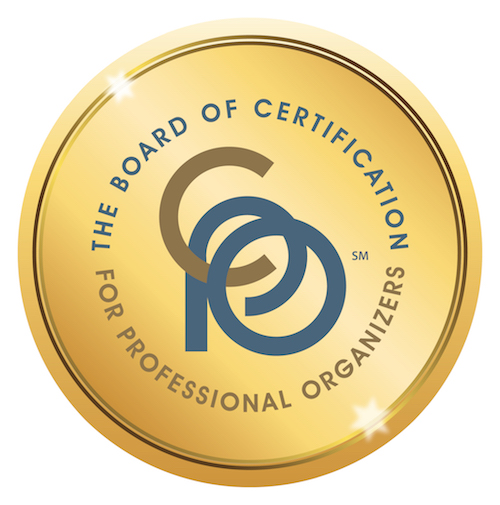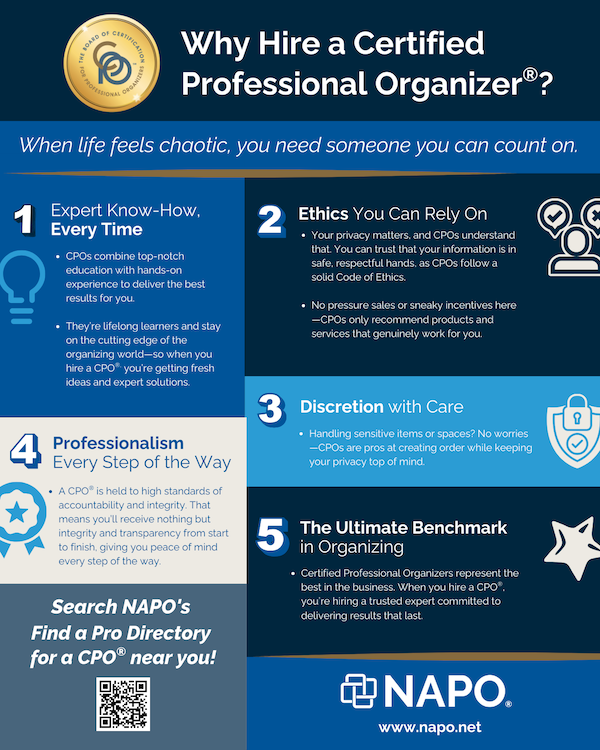Certified Professional Organizer®
Certified Professional Organizer®
I am proud to say that I am a member of the inaugural class of the Board of Certification for Professional Organizers®, and have been a Certified Professional Organizer since April 2007.

In Checkbooks And Underwear Drawers: What Certified Professional Organizers Offer Our Clients
[This post originally appeared on the National Association of Productivity and Organizing Professionals’ Get Organized Blog on February 6, 2018.]
Blog provided by Julie Bestry, CPO®, Director of Program Development, Board of Certification for Professional Organizers
When clients hire professional organizers, they’re opening themselves up to deep vulnerability. They’re agreeing to feel as vulnerable as we do when we’re wearing a paper gown in the doctor’s office. No matter how important we know the medical appointment is – to diagnose or treat a problem – we still may shut down emotionally and go silent, or crack self-deprecating jokes, or have unexpected anxiety. We may consider putting our clothes back on and sneaking out hastily before the too-chipper nurse notices we’ve escaped. Similarly, from picking up the phone or sending a message through our contact pages to actually allowing us into their homes and offices, our clients, as the kids (may still) say, have “all the feels.”
Clients may feel foolish – What will we think if they don’t know how long to keep pay stubs, or how to balance a checkbook register, or what must be shredded to preserve their identities? Will a professional organizer laugh at them because they’re dressing out of the laundry room because clean clothes never make it back to the closet or park in the driveway because the garage is packed?
Clients may feel embarrassed – They may not have allowed anyone (from beloved friends to maintenance workers) into their homes in months or years because clutter blocks the hallways, or even because their spaces don’t look like magazine covers or feel company-ready.
Clients may feel judged – How often do we hear clients ask, “Is this the worst you’ve seen?” They fear we will wonder how they could have let things get this “bad” for so long. (If only they knew how proud we are of them for having the courage to call us in the first place.)
Clients feel broken – If they experience overwhelm or depression, anxiety or ADHD, hoarding behaviors or the natural consequences of aging (from forgetfulness to limited range of motion), it’s common for them to fixate on their perceived flaws and not recognize their skills or areas of potential.
As professional organizers, we are asking clients to put themselves in the hands of experts without feeling like they are losing agency or control.
How can we help?
This question is what we see as the heart of Board of Certification for Professional Organizers’ certification program. In order for us to give our clients confidence that they can achieve their goals and become the best, most productive, most organized versions of themselves, it’s our obligation to give them best of ourselves. We at the BCPO® envision achieving that in three ways:
Experience – Before ever sitting to take the certification exam, an aspiring CPO® must earn 1500 paid hours teaching, demonstrating, or transferring skills to clients. (Up to 250 of those hours can be substituted with specific education and experiential work hours.)
Why so many hours? When organizing clients feel vulnerable, they need to know that this is not our first rodeo, that when we’re detangling the math of their bank accounts or spelunking in their underwear drawers, we’re not going to exclaim, “What the is this? I’ve never seen this before!” The more experience we have as professional organizers, the more confidence we can instill in our clients.
Education – The central requirement for maintaining the BCPO® certification credential, once earned, is continuing education to gain skills and knowledge to better serve our current and future clients. While at least 36 hours of continuing education units are required for every three-year certification period, many CPOs make a point of earning much more than the minimum and are creative in the knowledge they seek.
In addition to general classes about organizing and productivity, CPOs also seek out knowledge about neurobiology (ADHD, executive function disorders, and dementia) and psychology, about motivation and project management, about space design and ergonomics. Our clients come from across life’s rich pageant; by committing to continuing education, we are also making a commitment to grow and learn on each client’s behalf.
Ethics – The BCPO® Code of Ethics doesn’t just say, “I swear not to be icky.” Among the various principles of this code, which anticipate each of our clients’ fears and vulnerabilities, we assert that:
- I will only offer professional organizing services in those areas in which I am qualified, and I will accurately represent those qualifications in all verbal and written communications.”
- I will respect a client’s wishes with respect to confidential treatment of client information.
- I will use reasonable means to keep all client records and materials in my possession secure and confidential unless the client gives me written permission to make such records or materials public.
- I will only recommend products and/or services that my clients need or desire.
More importantly, the BCPO® Code of Ethics is enforceable. Each CPO® not only agrees to be bound by the principles, but also promises to report any violations of Code by others. It creates a binding ethics complaint procedure, whereby clients or colleagues can report, and a committee can review, a CPO’s behaviors. This Code has teeth – we abide or risk disciplinary action or revocation of certification.
Nothing in the above framework is meant to imply that our colleagues who have chosen a different path, who have not (or not yet) opted for certification, are lacking in these areas. Rather, we see the Certified Professional Organizer® credential as one way to identify us as a safe port in the storm, like a Good Housekeeping Seal of Approval, only instead of toasters or vacuums, we’re creators of order and productivity. We believe that building our experience and education, and taking our Code of Ethics seriously, puts the focus on the needs of our clients, and values our role in empowering them and making them feel less vulnerable. If their checkbooks balance and they can find matching socks, all the better!
Julie Bestry, CPO®, is President of Best Results Organizing in Chattanooga. As an organizer, speaker, and author, Julie helps residential and business clients save time and money, reduce stress, and increase productivity through new organizational skills and systems.
Why Hire a Certified Professional Organizer®?

For more information about professional organizing certifications, see Everything You Want to Know about Becoming a Certified Professional Organizer, written by Julie and originally published at MetropolitanOrganizing.com.



Follow Me